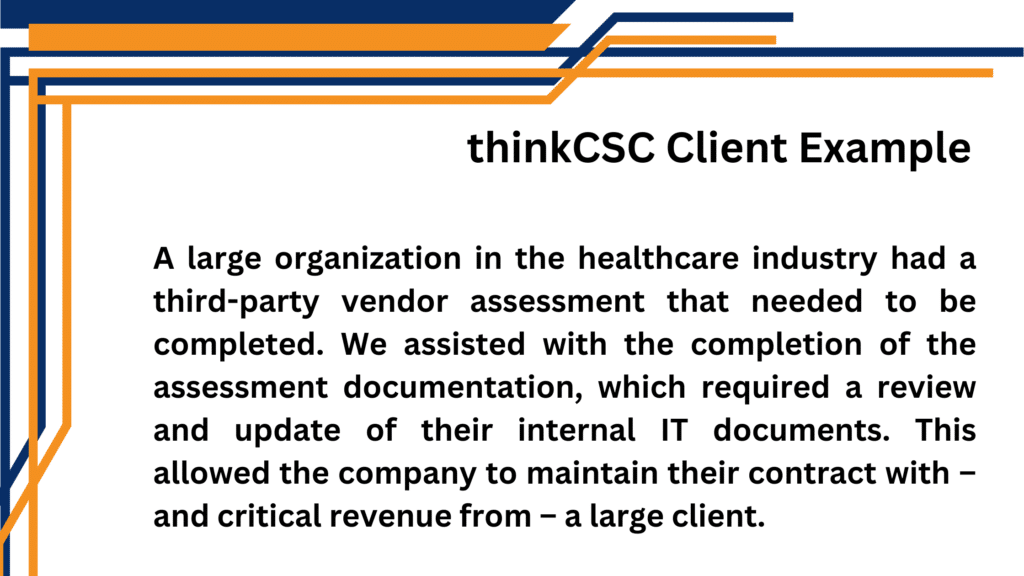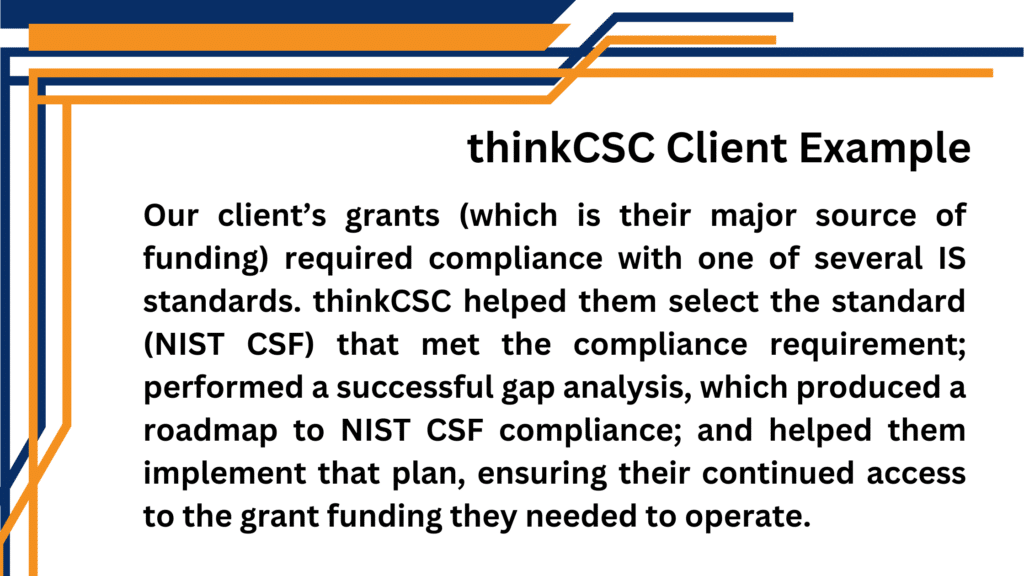
Do you want, or already have, contracts with large companies? Do these large contracts account for a sizable portion of your revenues? Does a significant portion of your funding come from grants?
To keep these contracts and grants – and to have a competitive advantage when considering obtaining new ones – your business may need to meet and adhere to compliance requirements, such as NIST, CMMC, PCI, HIPAA, and other guidelines. And you may not be the only one required to meet these requirements. Your third-party vendors may also be required to meet certain industry and government standards.
As you solicit larger contracts, it’s important to realize that compliance guidelines are becoming stricter and more complex.

Meeting Compliance Requirements to Land Larger Contracts
To reduce their own liability risk, many companies are requiring the smaller businesses with whom they contract to meet the same security requirements as larger companies. That kind of investment can put you out of the running. But did you know that you can achieve the same level of security that your potential large contracts have by partnering with a managed IT firm?
“Businesses don’t have to become cybersecurity experts, but they’re going to be held more accountable for their cyber defenses. Fortunately, there are organizations out there that can help.” (SBN)
Federal Contracts
For many small and midsize businesses, federal contracts can propel growth to an entirely new level. However, to meet the requirements for even submitting an RFQ to the government, your company must meet several compliance requirements. NIST offers specific guidance for meeting compliance for federal contractors, which you’ll find at the end of this article.
Even if you are not trying to contract directly with the government, you will be required to meet those same standards if you are trying contract with a business that does have contracts with the government.
Meeting IT Security Requirements Unlocks Opportunities
Small and midsize businesses competing for grants have an immediate advantage if they comply with NIST framework guidelines. You can be guaranteed that if you’re trying to obtain grant funding, the organizations from whom you are requesting grants will rigorously evaluate your security protocols. With the cost of data breaches reaching into the billions, risk mitigation is one of the essential steps in selecting the right partner.
Compliance Isn’t a One-and-Done Approach
To meet and maintain compliance requirements, your business can’t just install software and walk away. Regulations and requirements change all the time. Consider the recent change in the FTC Safeguards Rule and how that has impacted so many organizations.
Security compliance requires layers of security, policies, and careful documentation that demonstrate how you’re meeting the requisite standards. If a breach does occur and you’ve failed to meet your compliance requirements, you could be putting your business at risk.
Start with an Assessment
If you’re serious about business growth and are competing for bigger contracts or securing grant funding, the best place to begin is with an assessment of your current security. This will help you identify any compliance gaps you may have and the steps necessary to overcome them. An assessment can help you determine not only gaps in infrastructure and software, but where you’re lacking in policies and procedures, training, and other areas, that can leave your business out of the competition for contracts.
If you’re interested in competing for government and business contracts to grow your business, thinkCSC can help you meet the expectations of your potential big clients. Get in touch to learn more.
NIST Resources for Contract Compliance in IT SecurityDFARS Cybersecurity Requirements – Provided here is information for Department of Defense (DoD) contractors that process, store, or transmit Controlled Unclassified Information (CUI) and must meet the Defense Federal Acquisition Regulation Supplement (DFARS). DFARS provides a set of basic security controls. NIST Cybersecurity Frameworks – This voluntary Framework consists of standards, guidelines, and best practices to manage cybersecurity risk. NIST SP 800-171 – This publication provides requirements for protecting the confidentiality of CUI. SBIR.gov – The SBA-supported Small Business Innovation Research (SBIR) and Small Business Technology Transfer (STTR) website has many resources for small businesses doing business with the Federal Government. |


